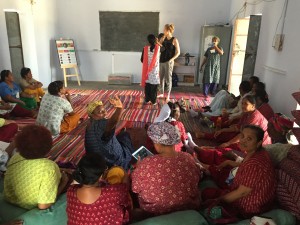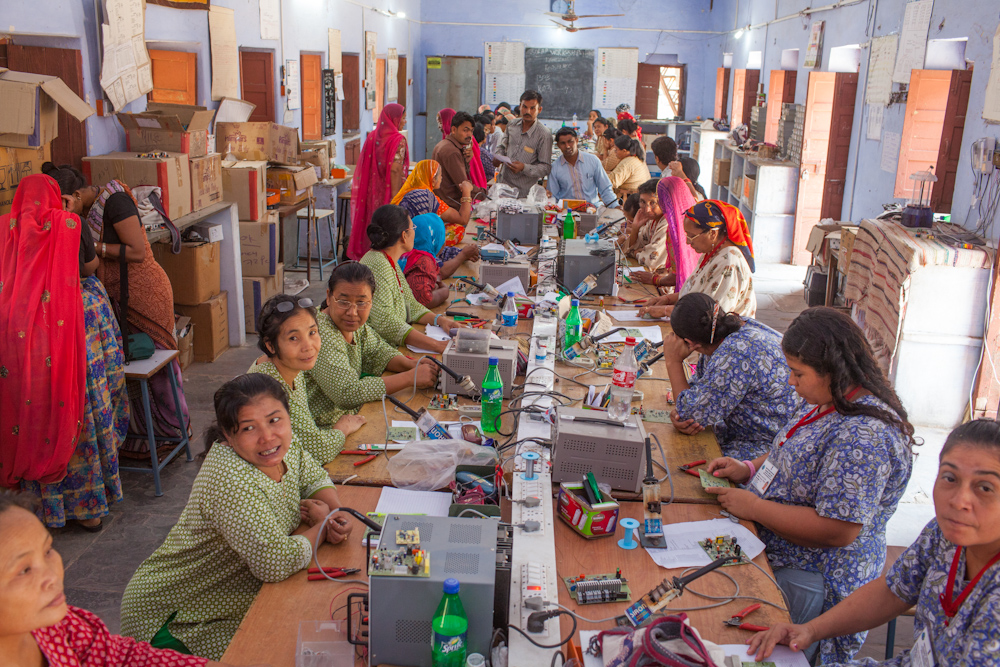
Walking into the room which housed some of the solar mamas and the Enriche program head Lucie (Anu in Hindi) was a crescendo of laughter and excitement. The women were so happy to see us and instantly livened up the atmosphere with their contagious smiles and personalities. We had the pleasure of hearing from Lucie, the head of the Enriche program at Barefoot which strives to empower women through self defense class as well as facilitating powerful discussions about stereotypes, social norms, and gender roles.
Below is a large portion of the talk Lucie gave to us, but we feel it encapsulates all that this project and the college is striving to do. The dialogue also gives a better picture as to how the solar mamas spend their six months and also how they are chosen to go through the program, as it is not easy to be selected.
Lucie :
“When they come, they’re not sure whether or not they can become a solar engineer. So give them a week, or ten days and it’s okay. That’s the reality of life. But when they leave, they’re also crying and they’re hugging us and we’re like, “why are you crying now? You’re going back to your family. Go back, be very happy and feel proud of yourself. Everybody will say ‘wow, they’re solar engineers!’” But the reality is that when they’ve been here in the positive environment they say, that when they go back, I spoke with the last group, a number of Indian solar trainees and they would say “But when I go back, I don’t know if my husband is going to take the money that I earned from me, or is he going to let me spend it? I don’t know if he’ll use it to drink. And over here we notice that you can stand in a group of people and you can look them in the eye and you can speak with them. But that’s not going to be the same in my village. I’ll be expected to stay inside in the house most of the time.”
So therefore we realized that what we’re doing is an incomplete job. There’s a lot more that needs to be done. And we developed- we’re in the process of developing- what’s called Enriche curriculum, this is a pilot over here. And there are 8 areas we’ve selected that go from something like digital literacy, environmental stewardship to women’s health and hygiene focusing on reproductive health, to talking to them about self-awareness, self-confidence and how do we build that, to human rights. What are your rights? Is there a right to equality? Is there a right to education? So the other needs of livelihood, not just being a solar engineer. And what we want them to do is when they go back home eventually, if they’re going to a woman’s house where there is a girl who might be starting her period soon, go talk to them. Tell them this is the right way to dispose of a sanitary napkin, this is the proper way to do it. This is how you keep clean, this is how you stay healthy. So we’re hoping that in doing all of that, they not only will change come in them, but gradually the change will also come in the villages in which they live in. And therefore the positive environment that you find here is the positive environment in the community. We also realize that the work we are doing here is just scratching the surface. We have very limited time with them because the solar engineering program takes most of the time. So, we are also planning on them talking to the partner organizations on the ground over there and to see how can they make this program a regular feature. Maybe it’s a self-help group that’s needed in their locality and maybe have a meeting once a month, once a week. Whatever seems to make the best use of time. We’ll talk about savings over here, we’ll talk about budget, we’ll talk about how to open a bank account, and they need to continue that work. But this is our step so that we don’t feel that just by making them solar engineers we’re done with our job. We’re not, we have a long way to go. So this is actually the first digital literacy class for this session and we’re learning how to take pictures, videos. And now we’re just taking pictures and videos of each other, singing songs, making videos. But the goal, as we just had a conversation is that we hope to find the money where we can have at least one iPad at each partner organization’s place. So when they go out into the field, if they have trouble with a circuit, we hope to teach them: take a picture, email that to us so someone will better get back to you instead of trying to explain it on the phone that this doesn’t work so the resistor needs adjusting or the capacitor needs to move. Although it seems to be all fun right now, there is a goal. We talked about what else they would like to learn and it seems like a lot of them would like for us to download apps to learn how to speak Hindi.”
Question – Where is everyone from?
Zimbabwe, Micronesia, Liberia, Fiji
Question – How do you select women?
Lucie – “There’s a team that would be made up of our partner organizations and somebody from this organization because the local organization on the ground is the best organization to help us go into the village and talk to the people over there. Because we need everyone’s buy in. A village is not going to just, you know, you can’t randomly knock on a door and say, ‘hey, can we take you for 6 months?’ The village elders, the entire community needs to have a buy in and say, ‘we feel that these women are the best women.’ And then you talk to them, and you say okay, of these women, let’s select these.”























